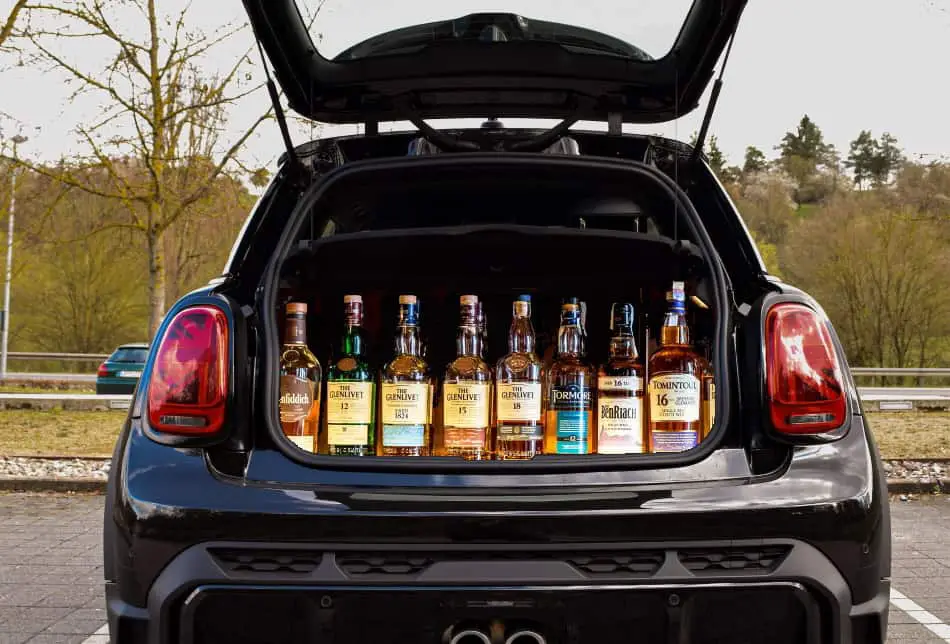Obviously, keeping your whiskey in a car long-term is not optimal, but what if you need to leave it there temporarily or you accidentally forgot it there overnight? And does the temperature of the car make a difference? Here’s everything you need to know about whether whiskey goes bad if left in a car.
Whiskey left in a car can go bad as it’s likely to be exposed to sunlight that damages it and be left lying down which leads to it oxidizing sooner. If the car is also very hot, the whiskey will evaporate faster than usual, and if the car is very cold the whiskey’s aromas and flavors will be temporarily muted.
In the rest of this article, I’ll go into more detail about what makes whiskey go bad if left in a car and the additional factors involved when the car is very hot or very cold. That way, if it becomes necessary you’ll be able to find a way to keep your whiskey in your car temporarily without it being negatively affected. And if you’ve already left your whiskey in the car, you’ll know how bad the damage is.
(As a side note, I wrote an article that explains all the things that can make whiskey go bad even when it’s not left in a car, which you can find here.)

Why Whiskey Goes Bad If Left in A Car
Firstly, whiskey can go bad if left in the car regardless of its temperature. That’s because in a car, whiskey is more likely to be exposed to sunlight that can damage it and be left lying down which can lead to a looser cork and your whiskey oxidizing sooner.
It’s Likely to Be Exposed to Sunlight That Damages It
Since most of a car is not very far away from a window, whiskey kept inside it is more likely to be exposed to sunlight that can damage it.
Sunlight damages whiskey because its ultraviolet rays create a chemical reaction in the volatile compounds of the whiskey which causes them to break down, and the flavor to degrade. Additionally, the sun’s ultraviolet rays will bleach out the color pigments of the whiskey and over time discolor it.
It takes a month or two for sunlight to fully degrade the flavors and color of your whiskey, but that doesn’t mean it’s okay to keep your whiskey in your car for less time than that as there can be some minor degradation in a few days or even, depending on the exact conditions, a few hours. And depending on your whiskey you may not want to risk even the slightest loss of flavor.
If you do need to leave your whiskey in your car temporarily, make sure you keep it away from the sunlight or in something that can protect your whiskey from its ultraviolet rays. For more information about storing whiskey properly in general, see the more detailed article about it here.
If you’ve already left your whiskey in your car accidentally then, depending on your whiskey and how long it was in the sunlight, you can expect some degradation in its flavors and color.
It’s Likely to Be Lying Down Which Leads to Oxidation
Since a car is mobile, whiskey kept inside it is likely to be placed there lying down. This does reduce the chance of the bottle breaking but it can also lead to a looser cork and your whiskey oxidizing sooner.
Oxidation is when oxygen binds to one chemical compound and turns it into another, and in whiskey that means binding to one flavor compound and turning it into another. Whiskey that’s gone bad in this way is not dangerous to drink – it’s still drinkable, but it does mean that it won’t taste the way it’s supposed to so it’s something to be avoided.
Oxidation starts as soon as your whiskey becomes exposed to air – which is usually when you first open the bottle, but it doesn’t change the flavors of your whiskey immediately. That usually takes anywhere from six months to two years depending on how much air gets into the bottle.
However, whiskey stored lying down will oxidize sooner. That’s because when the bottle is horizontal, the whiskey will come into contact with the cork. Whiskey has a high alcohol content level (between 40% – 68%ABV) which is more than enough to damage any cork that it’s in prolonged contact with.
And a damaged cork means a looser cork that lets more air into the bottle, which speeds up the process of oxidation.
If you do need to keep your whiskey in your car temporarily, then you need to find a way to keep the bottle upright – and secure so that it doesn’t fall over and smash when the car is moving.
If you’ve already left your whiskey lying down in your car accidentally then, depending on the ABV of your whiskey, the seal of the bottle and how long you left it, there may be some damage to the seal and a change in the flavors of your whiskey.
Why Whiskey Goes Bad If Left in A Hot Car

There are two additional ways whiskey can go bad if left in a car that’s very hot. It will evaporate quicker and oxidize sooner – even if left standing up.
It Will Evaporate Quicker
Whiskey is always evaporating from the bottle. That’s because although many seals are airtight, they’re not 100% airtight, which means there’s still some room for the whiskey to escape.
Fortunately, evaporation is slow, and the amount of whiskey lost to it is minimal, so it usually only becomes a problem if you’re storing your whiskey for many years – it takes about 10 years for the amount lost to be noticeable and 30 – 40 years for it to be significant.
However, if you keep your whiskey in a very hot car it will evaporate faster than usual.
It Will Oxidize Sooner
As mentioned, oxidation is when air gets to your whiskey and changes its flavors, and if the seal becomes damaged and loose because the bottle was left lying down putting the seal in constant contact with the high ABV whiskey, then it will let more air into the bottle and cause the whiskey to oxidize sooner.
A similar thing can occur when whiskey is left in a very hot car. That’s because whiskey expands in the heat which also brings it into constant contact with the cork – even if the bottle was left standing up. Once again, the cork will become damaged and loose, which lets more air into the bottle and causes your whiskey to oxidize sooner.
If you do need to keep your whiskey in your car temporarily, then you need to reduce the car’s temperature or put your whiskey inside something that keeps it cool. The best temperature for whiskey to be stored in is 15°-20°C or 59°-68°F so try and get your car or the container you’re putting your whiskey in, as close to that as possible.
If you’ve already left your whiskey in a hot car accidentally then, depending on the ABV of your whiskey, the seal of the bottle and how long you left it, more whiskey may have evaporated than usual and there may be some damage to the seal and a change in the flavors of your whiskey.
Why Whiskey Goes Bad If Left in A Cold Car

There are two additional ways whiskey can go bad if left in a car that’s very cold. It’s aromas and flavors can become muted, and your whiskey can become cloudy.
It’s Aromas and Flavors Can Become Muted
Very cold temperatures mute a whiskey’s aromas and flavors. That’s because flavor molecules don’t evaporate at lower temperatures and if they don’t evaporate you can’t smell them. And since flavor is smell as well as taste, with no aromas to smell you won’t get all the whiskey’s flavors either.
It Can Become Cloudy
Very cold temperatures can make whiskey become cloudy. That’s because its natural fatty acids, esters and proteins, that are usually dissolved in the alcohol, un-dissolve at lower temperatures. They then clump together and once there are enough of them, make your whiskey cloudy.
Fortunately, unlike the other problems mentioned with leaving whiskey in a car, which damage whiskey permanently, both problems with leaving whiskey in a cold car can be fixed by allowing the whiskey to return to room temperature.
Once whiskey is returned to room temperature its flavor molecules can evaporate and you’ll be able to smell its aromas and therefore pick up all its flavors. Additionally, the fatty acids, esters and proteins will re-dissolve and your whiskey’s original golden appearance will be restored.
